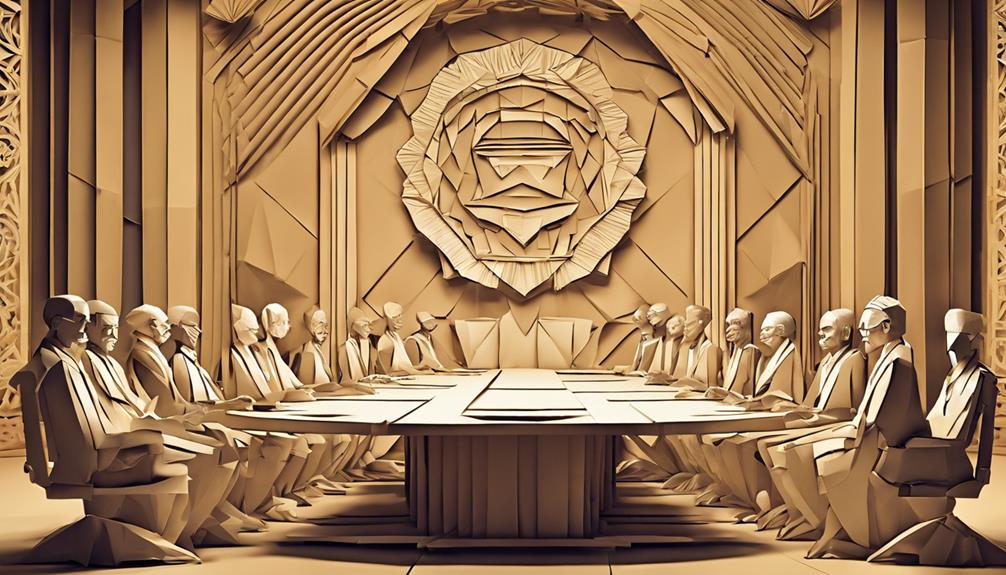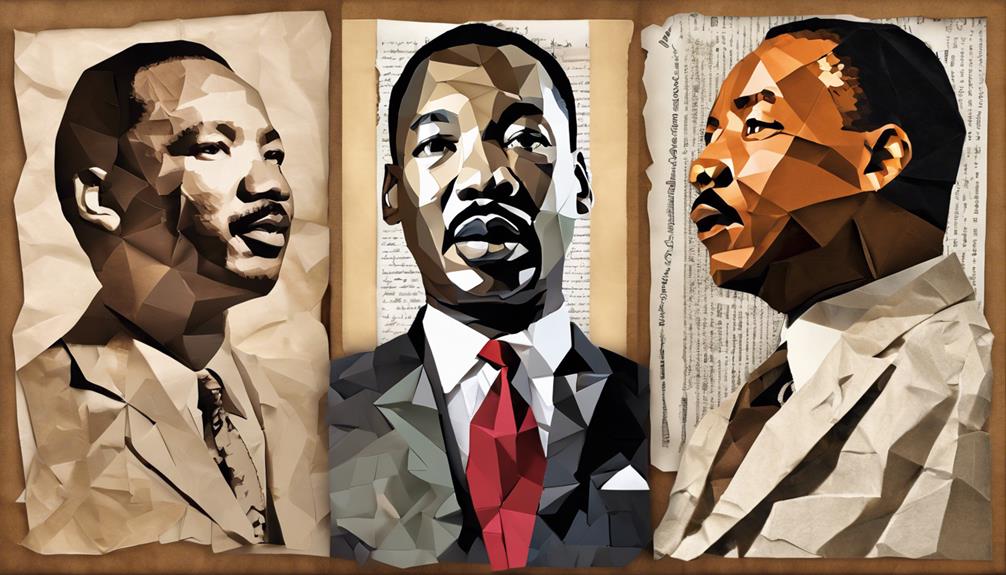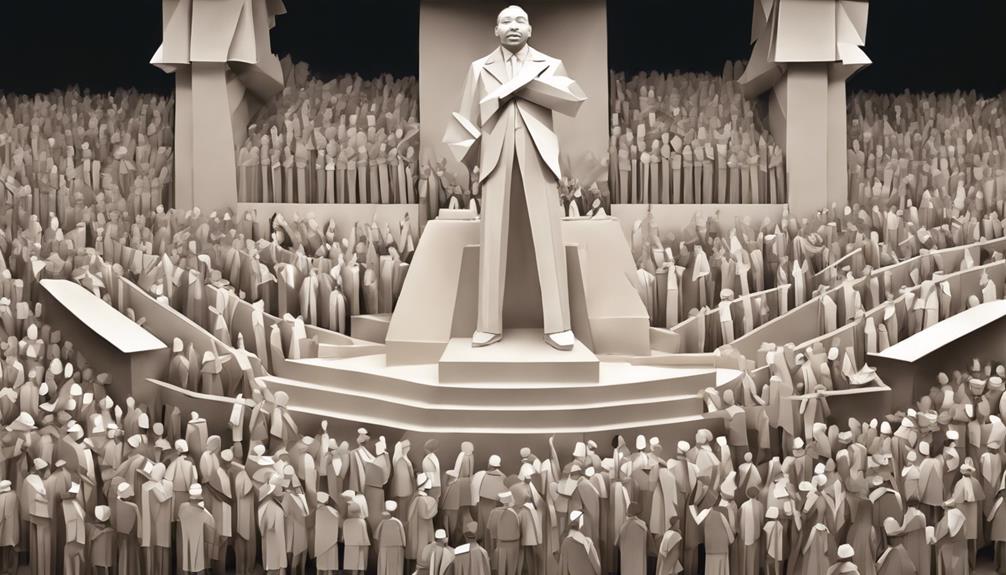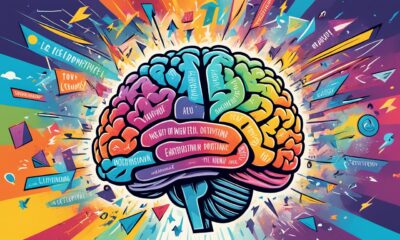Common Mistakes and Life Lessons
Avoid These Biggest Mistakes in Life – Tips for You
Discover how to navigate life’s journey without regret. Learn about the biggest mistakes in life and gain tips to help you thrive.

Do you know some mistakes in life that lots of us make without noticing? These errors can really slow down our personal and job growth. They stop us from being our best and hitting our targets. Knowing and dodging these slips is key to a better and brighter future.
Key Takeaways:
- Awareness of common mistakes can help us avoid them and lead a more fulfilling life.
- Identifying and avoiding pitfalls can contribute to personal and professional growth.
- Mistakes can hinder us from reaching our full potential and achieving our goals.
- By learning from mistakes, we can chart a path towards success and fulfillment.
- Avoiding common mistakes requires self-awareness and making intentional choices.
Rule 1: Own the morning
One of the key habits for success is to own the morning. Waking up early and having a morning routine sets the tone for your day. You might journal, take a walk, do deep work, or meditate.
Winning the morning brings a feeling of accomplishment and motivation. Starting with intention lets you control your time and focus. It builds momentum to achieve your goals.
The Power of a Morning Routine
A structured morning routine helps you tackle your tasks efficiently. It offers time for activities that refresh your mind, body, and soul. Through journaling, you can reflect on your goals and set your day’s intentions.
Walking or mindfulness clears your mind for the day ahead.
“Success is to be measured not so much by the position that one has reached in life as by the obstacles which he has overcome.” – Booker T. Washington
Deep work lets you focus on tough tasks. It’s about spending time without distractions on things that need creativity and focus.
Physical exercise in the morning boosts energy and health. It could be a workout, yoga, or a jog. It makes you alert and ready for the day.
| Benefits of Owning the Morning | Examples of Morning Activities |
|---|---|
|
|
Taking time to own the morning puts you in charge of your day. It’s about making a routine that matches your goals and values. Small, consistent steps lead to big results over time.
Rule 2: Only focus on what’s in your control
A common mistake is focusing on things out of our reach. The world has many factors we can’t control. But Stoic philosophy teaches us to concentrate on what we can manage.
Stoicism tells us to put our energy into things we can change. This way, we don’t waste time on what we can’t influence.
“The chief task in life is simply this: to identify and separate matters so that I can say clearly to myself which are externals not under my control, and which have to do with the choices I actually control.” – Epictetus
Focusing on what we control empowers us. We can take steps towards our goals. We focus on impactful actions and decisions, becoming leaders of our own lives.
So, how can you make this rule work for you?
Identify what’s within your control
Think about what you can control in your career. This includes your mindset, how hard you work, learning new things, and the relationships you form. By knowing these areas, you can make real changes.
Acknowledge what’s beyond your control
It’s also key to know what you can’t control. Things like market trends or other people’s choices are out of our hands. Accepting this can reduce stress.
Develop a proactive mindset
Knowing what you control is the first step. Then, you must take action. Being proactive means seeking out opportunities and using what you have. It’s about creating your own path, not waiting.

By focusing on what you control and following Stoicism, you can guide your career with purpose. Remember, there’s great power in focusing on where you can have an impact and letting go of the rest.
Rule 3: Don’t suffer imagined troubles
Our minds often drift into make-believe worlds, dreaming up possible issues. These fantasies can cause stress and worry in our lives. By focusing on the here and now, we can steer clear of these imagined problems and discover calm in the current moment.
Mindfulness means being totally aware of our thoughts, emotions, and physical sensations without judgment. By embracing mindfulness, we learn to keep our minds in the present. This stops us from stressing over future possibilities or past regrets. It helps keep us away from stress and worry about things that might not even happen.
A great way to stay in the present is by concentrating on our breathing. By taking deep breaths and noticing how it feels to breathe in and out, we can root ourselves in the now. This simple mindfulness method brings clarity and peace, helping us release anxious thoughts and stay balanced.
Activities like meditation or yoga are good for encouraging mindfulness too. They help us be more aware of our thoughts and feelings. This awareness lets us notice when we’re lost in fake worries. By watching these thoughts without judgment and coming back to the present, we can escape the cycle of stress and worry.
Remember, the future is always unknown, and fretting over it just takes away our current joy and peace. Staying mindful and in the moment prevents the suffering imagined troubles bring. Embrace the present’s power for a more free and peaceful life.
“The greatest weapon against stress is our ability to choose one thought over another.” – William James

By practicing mindfulness, you can dodge imagined worries and enjoy calmness now.
Rule 4: Treat success and failure the same
Seeing success and failure with an equal eye is key for growing constantly. By knowing both success and failure help us learn, we walk our career paths more wisely. This balanced approach helps us stay focused.
Being resilient is vital for treating both success and failure the same. It means we can recover from hard times, adapt to changes, and keep going, no matter what. Resilient people see failures as chances to get better, not as stops.
“The impediment to action advances action. What stands in the way becomes the way.” – Marcus Aurelius
Marcus Aurelius knew the value of resilience for self-improvement. He taught that handling success and failure with strength keeps us steady, regardless of what happens around us.
Staying humble with success is important. It feels good but shouldn’t make us lazy. It should push us to keep aiming high.
On the other hand, don’t view failure as a stop. See it as a chance to learn and shape our future better. Learning from failings helps us adapt, enhance our skills, and do better next time.
Viewing both success and failure as guides builds a tough mindset. This approach helps us meet challenges, learn from troubles, and greet new chances with boldness and modesty.
Resilience in the face of success and failure
Not everyone is born resilient, but we can all learn it. Here are ways to be more resilient:
- View failure as a lesson: Rather than fretting over what went wrong, think about what it taught you for next time.
- Get advice and learn from others: Ask for thoughts from people you respect to see different views on your successes and failures.
- Cheer on your victories: Even the little wins are worth celebrating. They boost your spirit and make you stronger.
- Keep growing: Face challenges head-on, see troubles as temporary, and trust in your ability to learn and recover.
- Look after yourself: Your body and mind need care to face challenges. Ensure you rest, relax, and do things you enjoy.

The fear of making mistakes
Feeling scared of messing up in your career is common. This fear of failing can stop you from taking chances. It can also slow down your growth. But remember, making mistakes helps you learn important lessons and grow personally.
Beating this fear means getting okay with taking safe risks. When you try new things, you find new chances to grow. Growth happens when we face our fears and try harder.
“The only way to avoid making mistakes is to do nothing. And doing nothing is the biggest mistake you can make.” – William Ward
Think of mistakes not as failures, but as chances to learn. Each mistake can teach you something important. With a mindset focused on growth, you’ll see obstacles as ways to get better.
To overcome the fear of messing up, being resilient is crucial. Failure isn’t the end; it’s a chance to come back even stronger. Thomas Edison once said he found 10,000 ways that didn’t work. Mistakes are lessons that can help you reach your goals.
Don’t let the fear of making mistakes freeze you. Instead, let it push you towards growing and achieving. See the worth in taking risks, welcome growth, and view mistakes as chances to improve.

Letting somebody else make career decisions for you
It’s easy to lean on others for career advice. Yet, letting others chart your career path can bring regret. It’s good to get advice, but trusting your own gut is key. It’s about matching decisions with your skills, likes, and values.
Making your own career decisions celebrates your uniqueness. It means picking a sector, trying roles, or starting a business that fits you. It lets you be true to yourself and craft a career that shines a light on you.
Listening to yourself doesn’t mean you ignore others’ advice. It’s about balancing it with what feels right to you. Take in what mentors and family suggest. But remember, the last word should always be yours.
“Your time is limited, don’t waste it living someone else’s created by someone else’s plan.” – Steve Jobs
Benefits of following your own path in career decision-making
- Authenticity: Trusting your gut leads you to choices true to you, giving work life more joy and meaning.
- Freedom: Carving your own path puts you in the driver’s seat, opening up thrilling avenues to explore.
- Resilience: Trusting in your judgment builds strength to tackle and beat the hurdles you encounter.
- Passion: Deciding with your heart fuels your drive, filling your career with things you love to do.
- Success: Paving your own way increases your chances to excel, driven by your passion and investment in your work.
Following your heart in your career can be scary and risky, but it’s a journey toward true happiness and success.

Underestimating the importance of networking
Networking is key to career success. It helps you by offering opportunities, support, and guidance. It’s not just for extroverts; introverts can find ways to network that suit them too.
Not valuing networking means missing out on important connections. These can help you grow and advance in today’s connected world. A strong network is crucial for climbing the career ladder and reaching your goals.
Engaging in networking opens up new job opportunities, collaborations, and mentorships. Connecting with professionals and colleagues provides valuable insights. Your network can connect you to the right people, potential clients, or employers and expose you to new opportunities.
“Your network is your net worth.” – Porter Gale
Invest time in networking events, conferences, and online. This builds your presence, expands your knowledge, and opens up growth opportunities. Attending conferences and joining groups connects you with information, trends, and like-minded individuals.
Maintaining relationships can lead to long-term success. A good network offers guidance, advice, and opportunities as you progress in your career.
A strong network helps exchange ideas, collaborate, and find mentorship. Leverage your network’s knowledge and experience to navigate challenges and make informed decisions.
The Power of Networking in Career Success
Networking creates a sense of belonging in the professional world. It builds a support network that understands your goals and challenges. This network provides encouragement and inspiration for career success.
As you network, remember to support others too. Offer your expertise and resources to build a supportive ecosystem. This mutual support uplifts everyone involved.
Networking is about building relationships, not just personal gain. It fosters community and contributes to others’ success. Embracing networking opens opportunities, collaborations, and growth.
| Benefits of Networking | How to Build Your Network |
|---|---|
| Access to job opportunities | Attend industry events and conferences |
| Professional guidance and mentorship | Join professional organizations |
| Insights into industry trends and developments | Engage in online networking platforms |
| Collaboration and partnership opportunities | Build relationships through informational interviews |
| Increased visibility and personal branding | Nurture existing relationships through regular communication |
Not keeping your skills sharp or engaging in continuous learning
It’s key to keep learning in today’s fast-evolving job market. To be competitive and up your success chances, investing in skill growth and seeking relevant training is vital.
Continuous learning lets you grow your knowledge, gain new skills, and keep up with industry trends. Staying ahead makes you valuable to employers and opens new career paths.
There are many ways to keep learning. You can take online courses, go to conferences and workshops, join professional groups, and read industry news. These actions provide insights, introduce new ideas, and help you stay informed.
“The future belongs to those who are willing to learn and adapt.” – John C. Maxwell
Benefits of continuous learning:
- Keeps your skills up-to-date with industry advancements.
- Enhances your problem-solving and critical thinking abilities.
- Increases your job satisfaction and career fulfillment.
- Boosts your confidence and self-esteem.
- Expands your professional network and opportunities for collaboration.
- Positions you as a lifelong learner and demonstrates your commitment to growth.
Tips for staying current:
- Set aside dedicated time for learning and skill development.
- Identify your strengths and areas for improvement and focus on targeted learning.
- Stay abreast of industry news and trends through newsletters, podcasts, and social media.
- Connect with professionals in your field through networking events and online communities.

Embrace continuous learning and focus on skill development to stay ahead. This approach makes you adaptable and sets you up for long-term career success.
Failing to clarify your career priorities
Building a successful career starts with clear priorities. Knowing what’s important at each stage of your life helps make smart decisions. This leads to fulfillment in your job.
Consider your values, long-term goals, and work-life balance when setting priorities. Aligning your career choices with your biggest goals is key.

Goal-Setting for Career Success
Setting SMART goals is crucial. These are specific, measurable, achievable, relevant, and time-bound objectives. They break your big dreams into smaller steps, creating a roadmap to success.
Goal-setting gives direction and helps track progress. Think about your career milestones and set clear objectives. These will guide your choices.
Striking a Work-Life Balance
Achieving work-life balance is vital. It means finding the right mix between your job and personal life. This balance is key to happiness and long-term satisfaction.
Think about how much time and energy you can give to your career. Also, consider the importance of family, health, and leisure. A good work-life balance allows personal growth, strong relationships, and relaxation.
Making Informed Career Choices
Knowing your career priorities leads to better job choices. It matters whether you seek financial success, want to impact society, or find job fulfillment. Understanding your priorities helps evaluate opportunities that match your goals.
Clear priorities aid in tough decisions, like eyeing a promotion or changing careers. Weigh the pros and cons of each choice. This helps support your long-term career joy.
“The future depends on what you do today.” – Mahatma Gandhi
Putting it All Together
Career success takes understanding your priorities. By knowing what matters, setting goals, and aiming for balance, you navigate your career with purpose.
Reflect on your values, ambitions, and the legacy you wish to create. With clear priorities, you can make choices that fit your personal and professional life.
Conclusion
Avoid career mistakes by being self-aware and making smart choices. Keep learning and build strong networks. This way, you can have a successful career.
Knowing yourself is the first step to avoid career mistakes. Understand what you’re good at and what you love. Make sure your career fits these.
Be proactive in deciding your career path. Think about your future goals. Take risks that help you reach those goals.
It’s important to keep learning because jobs keep changing. Stay updated on your field and learn new things. This helps you move ahead in your career.
Don’t forget the power of good relationships. Connect with people who can guide and support you. This includes colleagues, mentors, and others in your industry.
Follow these tips to dodge career mistakes and achieve success. It’s never too late to change for the better. You can always guide your career towards success. Aim high and keep pushing forward.FAQ
What is the first rule for avoiding the biggest mistakes in life?
What is the second rule for avoiding the biggest mistakes in life?
How can I avoid getting caught up in imagined troubles?
How should I treat success and failure?
How can I overcome the fear of making mistakes?
Should I let others make career decisions for me?
How important is networking for career success?
How can I stay current and continuously learn in today’s job market?
How can I clarify my career priorities?
What do I need to do to avoid the biggest mistakes in life and build a successful career?
How Can Avoiding Mistakes in Life Lead to Better Learning and Growth?
Avoiding mistakes in life can lead to better learning and growth. By submersion vs immersion comparison, we can see that being fully immersed in experiences, rather than just dipping our toes in, allows for greater understanding and development. Embracing mistakes as part of the learning process can lead to more profound growth.
Are the Biggest Mistakes in Life Relevant for New Dads?
New dads may feel overwhelmed by the biggest mistakes in life, but a well-prepared survival guide for new dads can help navigate the challenges. Understanding that errors are part of the learning process can ease the pressure. Embracing the journey with patience and self-care is crucial for new dads.
Source Links
Common Mistakes and Life Lessons
Famous Negotiators Who Mastered the Art of Persuasion
You'll be amazed by the persuasive powers of history's greatest negotiators, but can you uncover the secrets behind their success?

You're about to uncover the secrets of famous negotiators who mastered the art of persuasion. From Mahatma Gandhi's nonviolent resistance to Winston Churchill's eloquence, you'll learn how to apply their techniques to achieve your own goals. Discover how historical figures like Abraham Lincoln, Queen Elizabeth I, and Martin Luther King Jr. used their negotiation skills to shape the world. By understanding their strategies, you'll be able to craft compelling arguments, build credibility, and establish rapport with others. As you explore the art of negotiation, you'll gain valuable insights to help you navigate complex situations and achieve remarkable breakthroughs – and that's just the beginning.
Key Takeaways
- Mahatma Gandhi mastered nonviolent resistance, civil disobedience, and fasting to negotiate for India's independence.
- Abraham Lincoln used storytelling, humor, and logical reasoning to persuade and unite the American people.
- Winston Churchill demonstrated eloquence, determination, and strategic thinking to rally Britain during World War II.
- Martin Luther King Jr. utilized peaceful protests, powerful speeches, and civil rights activism to negotiate for racial equality.
- Nelson Mandela employed inclusive dialogue, reconciliation, and collaboration to end apartheid in South Africa.
Mastering the Art of Persuasion
By grasping the psychological triggers that drive human decision-making, you can master the art of persuasion and effectively influence others.
To become a skilled persuader, it's vital to understand the psychology of influence and communication techniques. This involves using empathy, active listening, and framing to appeal to others' emotions and logic.
When you can put yourself in someone else's shoes and understand their perspective, you'll be better equipped to present compelling arguments that resonate with them.
Building credibility, establishing rapport, and presenting logical reasoning are also key in persuading others.
Remember, negotiation skills are valuable in all aspects of life, from business deals to everyday interactions.
By mastering the art of persuasion, you'll be able to effectively communicate your ideas and achieve your goals.
All rights reserved to those who are willing to learn and practice these essential skills.
Negotiation Tactics of Historical Figures

Throughout history, iconic leaders have demonstrated exceptional negotiation skills, and understanding their tactics can help you refine your own approach to persuasion. You can learn a thing or two from the masters.
For instance, Mahatma Gandhi's nonviolent resistance, civil disobedience, and fasting tactics persuaded British colonial rulers to grant India independence.
Abraham Lincoln's storytelling, humor, and logical reasoning helped preserve the Union during the Civil War.
Winston Churchill's eloquence, determination, and strategic thinking rallied allies and contributed to the Allied victory in World War II.
Queen Elizabeth I's diplomacy, intelligence, and political acumen enabled her to navigate complex negotiations and maintain power in the 16th century.
Martin Luther King Jr.'s peaceful protests, powerful speeches, and civil rights activism advanced equality and justice through negotiation.
Skilled Diplomats in World History

You can learn from the diplomatic mastery of skilled diplomats throughout history, who've successfully navigated complex international relations and secured their nations' interests through shrewd negotiation and clever diplomacy. Their expertise has shaped the course of nations, and you can benefit from studying their strategies.
Here are a few examples of skilled diplomats who made a significant impact:
- Queen Elizabeth I of England: She secured her reign and established England as a major power in the 16th century through skilled diplomacy and negotiation.
- Cardinal Richelieu: He utilized cunning negotiation tactics and strategic alliances to consolidate royal power and elevate France's position in European politics during the 17th century.
- Metternich: He played a key role in shaping post-Napoleonic Europe through his diplomatic skills and negotiation efforts at the Congress of Vienna in 1815.
These diplomats, along with others, have demonstrated the power of effective negotiation and diplomacy in achieving their goals. You can learn from their experiences and adapt their strategies to navigate complex situations and achieve your own goals.
Icons of Effective Communication

Effective communicators like Nelson Mandela, Mahatma Gandhi, Winston Churchill, Martin Luther King Jr., and Margaret Thatcher have demonstrated the power of persuasion, inspiring and influencing millions through their remarkable negotiation and communication skills.
You might wonder what made them so effective. The answer lies in their ability to connect with people on a deeper level. They understood the importance of inclusive dialogue, nonviolent resistance, and powerful rhetoric.
Mandela's negotiation style emphasized reconciliation, while Gandhi's persuasive communication led India to independence. Churchill's powerful speeches inspired a nation during wartime, and King's powerful speeches and nonviolent protests advanced civil rights. Thatcher's strong communication skills earned her the nickname 'Iron Lady.'
You can learn from these icons by incorporating their strategies into your own communication style. Practice active listening, use persuasive storytelling, and remain resolute in your convictions. By doing so, you'll become a more effective communicator, capable of inspiring and influencing others.
Legendary Dealmakers in Action

Behind the scenes of historic agreements and diplomatic breakthroughs stand legendary dealmakers who've mastered the art of negotiation, leveraging their unique styles and strengths to shape global events.
You're about to meet some of the most remarkable negotiators in history, who've left an indelible mark on the world stage.
Take a closer look at these legendary dealmakers in action:
- Nelson Mandela: His negotiation skills were instrumental in ending apartheid in South Africa through collaboration and principled compromises.
- Margaret Thatcher: Known as the 'Iron Lady,' she utilized strong persuasion tactics in negotiations to achieve her political goals.
- Henry Kissinger: A master of diplomacy, he employed strategic thinking and geopolitical knowledge to negotiate key international agreements.
These legendary dealmakers have demonstrated exceptional negotiation skills, achieving remarkable breakthroughs in global politics and diplomacy.
As you explore their stories, you'll gain valuable insights into the art of negotiation, and how it can be used to shape the course of history.
Frequently Asked Questions
Who Was the Most Powerful Negotiator?
You're wondering who's the most powerful negotiator? Well, it's Nelson Mandela, who ended apartheid in South Africa through collaborative efforts, strategic thinking, and a firm yet conciliatory approach, earning him a legendary status in the art of persuasion.
What Is Voss' Theory of Negotiation?
You're likely familiar with Chris Voss, a former FBI hostage negotiator, and his theory of negotiation, which emphasizes tactical empathy, active listening, and emotional intelligence to build rapport and influence outcomes.
Who Is a Master Negotiator?
You're a master negotiator when you skillfully persuade others, finding common ground and achieving mutually beneficial outcomes, possessing strong communication skills, emotional intelligence, and strategic thinking to build relationships and navigate complex conversations.
Who Is an Effective Negotiator?
You're an effective negotiator when you can persuade others, build relationships, and achieve mutually beneficial outcomes by being a skilled communicator, active listener, and strategic problem-solver who remains calm under pressure.
Can a Keynote Speaker Utilize Persuasion Techniques of Famous Negotiators?
When it comes to understanding keynote speakers, it’s important to consider their ability to utilize the persuasion techniques of famous negotiators. A skilled keynote speaker can draw from the tactics used by successful negotiators to capture and hold the attention of their audience, ultimately swaying them towards their message.
Conclusion
As you reflect on the master negotiators who've shaped history, remember that persuasion is an art that can be honed with practice and patience.
The adage 'well-behaved women seldom make history' rings true, as many of these iconic figures took bold risks to achieve their goals.
By studying their tactics and strategies, you can refine your own negotiation skills, becoming a force to be reckoned with in your personal and professional life.
So, take a page from their playbook and confidently assert your influence – the world is waiting for your unique brand of persuasion.
Common Mistakes and Life Lessons
Is Social Media Ruining Society? Exploring the Debate
Keeping pace with the digital age, but at what cost: uncover the darker side of social media's impact on our collective well-being.

You're not alone in wondering if social media is ruining society. With billions of users worldwide, concerns about its impact on mental health, social skills, and real-life relationships are growing. Cyberbullying, FOMO, and unrealistic beauty standards can lead to anxiety, depression, and feelings of inadequacy. Excessive social media use can also hinder social skills, undermine relationships, and compromise privacy. To navigate this digital landscape mindfully, it's essential to prioritize privacy, monitor usage, and establish screen-free zones. As you explore the debate, you'll uncover more insights into the dark side of social media and discover ways to promote a healthier online experience.
Key Takeaways
- Excessive social media use is linked to anxiety, depression, and feelings of inadequacy, negatively impacting mental health.
- Cyberbullying, facilitated by anonymity and constant access, affects a significant percentage of teens, leading to self-harm and suicide attempts.
- Social media can hinder social skills and in-person interactions, undermining real-life relationships and genuine connections.
- Privacy and security risks, including data breaches and targeted advertising, pose significant threats to personal information and control.
- Establishing a healthy balance, prioritizing privacy, and being mindful of excessive use are crucial to mitigating the negative effects of social media on society.
Social Media's Dark Side Exposed
As you scroll through your social media feeds, you're likely unaware that you're stepping into a world where cyberbullying, mental health issues, unrealistic beauty standards, disinformation, and privacy concerns lurk in the shadows.
The negative aspects of social media can have a profound impact on your life, and it's important to be aware of these risks.
For instance, cyberbullying has become a significant problem, with 59% of US teens experiencing online harassment.
Additionally, excessive social media use has been linked to mental health issues like anxiety and depression, affecting 71% of young adults.
Unrealistic beauty standards promoted on social media can also lead to feelings of inadequacy, with 40% of users feeling pressured to look a certain way.
It's vital to recognize these risks and take steps to protect yourself.
Be cautious about what you share online, and avoid engaging with trolls or bullies.
The Mental Health Conundrum

As you navigate the world of social media, you're likely to encounter a myriad of challenges that can take a toll on your mental well-being.
You might experience anxiety from the constant pressure to present a perfect online persona, or feel isolated despite being connected to hundreds of 'friends.'
In this section, we'll explore the darker side of social media, including the cyberbullying epidemic, the crushing feeling of loneliness, and the anxiety that comes with it.
Social Media Anxiety
Frequently, you find yourself scrolling through social media, only to feel a nagging sense of anxiety creeping over you, and you're not alone. Social media anxiety is a real concern, affecting millions of users worldwide.
You might experience FOMO, constantly worrying that you're missing out on important events or updates. This fear can lead to feelings of inadequacy, especially when you compare your life to the curated highlight reels of others. In fact, 60% of people feel inadequate about their own life achievements after scrolling through social media feeds.
Excessive social media use can exacerbate anxiety, with studies showing a correlation between high social media usage and symptoms of anxiety. Moreover, cyberbullying, which affects 34% of students, can further contribute to mental health issues.
It's essential to recognize that social media anxiety is a common experience, and it's not a personal failing. By acknowledging these feelings and taking steps to limit your social media use, you can begin to alleviate anxiety and focus on nurturing your mental well-being.
Cyberbullying Epidemic
You're likely no stranger to the devastating impact of cyberbullying, which has become an epidemic on social media platforms, with 59% of U.S. teens facing online harassment.
As you navigate the online world, it's vital to acknowledge the severe mental health impact of cyberbullying. The statistics are alarming: victims of cyberbullying are over twice as likely to attempt self-harm or suicide.
The anonymity and 24/7 nature of social media contribute to the prevalence of cyberbullying, affecting 40% of young people worldwide. The consequences are long-term, with victims experiencing higher levels of anxiety, depression, and social isolation.
It's important to recognize the signs of cyberbullying and take action. If you're a victim, know that you're not alone, and there's help available. Report incidents to social media platforms, and seek support from trusted friends, family, or mental health professionals.
Let's work together to combat cyberbullying and promote a safer online environment.
Lonely in Public
Ironically, while social media connects you to hundreds of friends, it simultaneously exacerbates feelings of loneliness and social isolation, creating a phenomenon where you're lonely in public. You're surrounded by people, but the constant stream of curated updates and comparisons on social media can make you feel disconnected and inadequate.
| Social Media Use | Feelings of Loneliness | Mental Health Impact |
|---|---|---|
| Heavy use (> 2 hours/day) | Increased feelings of loneliness | Higher risk of anxiety and depression |
| Moderate use (1-2 hours/day) | Some feelings of loneliness | Moderate risk of anxiety and depression |
| Light use (< 1 hour/day) | Limited feelings of loneliness | Lower risk of anxiety and depression |
| No use | Minimal feelings of loneliness | Least risk of anxiety and depression |
Research suggests that excessive social media use can lead to increased feelings of loneliness and social isolation, which can negatively impact mental health. By being aware of your social media habits and taking steps to limit your use, you can reduce feelings of loneliness and promote better mental health.
Social Skills in Decline

As you spend more time interacting with screens and less time engaging in face-to-face conversations, you're likely to notice a decline in your ability to manage social situations with ease. Using social media as a primary means of communication can hinder your social skills, making it challenging to connect with others in person. Research shows that excessive social media use can impair your ability to interpret nonverbal cues and communicate effectively in real-life situations.
As a result, you may struggle to build meaningful relationships and engage in social interactions outside of the digital world. The lack of face-to-face communication practice can lead to difficulties in forming connections and handling social situations.
It's crucial to strike a balance between using social media and engaging in in-person interactions. By doing so, you can develop and maintain essential social skills, such as active listening, empathy, and conflict resolution. By being aware of the potential pitfalls of social media, you can take steps to cultivate healthier relationships and improve your overall social skills.
Privacy in the Digital Age

Your personal information is vulnerable to exposure on social media, putting you at risk of identity theft and fraud. As you navigate the digital age, it's vital to be aware of the privacy risks associated with social media. Targeted advertising, for instance, raises concerns about your lack of control over shared content and the potential consequences on your future opportunities and reputation.
| Privacy Risks | Consequences |
|---|---|
| Data Breaches | Identity Theft and Fraud |
| Targeted Advertising | Loss of Control over Shared Content |
| Phishing and Data Mining | Unauthorized Use of Personal Information |
| Misinformation and Echo Chambers | Manipulation of User Data |
| Unauthorized Use of Personal Info | Reputation Damage and Future Consequences |
To protect yourself, it's important to be mindful of the information you share online and adjust your privacy settings accordingly. By taking proactive steps to safeguard your personal information, you can minimize the risks associated with social media and ensure a safer online experience.
The Impact on Real-Life Relationships

As you scroll through your social media feeds, you can't help but wonder if the constant stream of curated relationships is affecting your own connections.
Are you sacrificing genuine, in-person interactions for the instant gratification of likes and comments?
Social Isolation Risks
Recognizing the importance of social interaction, it's crucial to acknowledge how excessive social media use can gradually undermine your real-life relationships. By dedicating more time to scrolling through social media platforms, you're potentially sacrificing valuable opportunities for in-person connections. Studies indicate that spending too much time on social media is associated with a decline in face-to-face social interactions and a sense of loneliness, ultimately leading to social isolation.
This can result in a diminished capacity for empathy and emotional bonding in personal relationships. Individuals who heavily rely on social media often have fewer intimate connections and report lower satisfaction with their real-life interactions. To mitigate the risks of social isolation, it's imperative to take proactive measures. Make a deliberate choice to reduce your social media consumption and prioritize direct interactions with others.
Arrange regular gatherings with friends and family, and participate in activities that foster meaningful relationships. By doing so, you'll be taking the initial step towards nurturing your real-life connections and safeguarding against the perils of social isolation.
Depth of Connections
Social media's impact on real-life relationships is multifaceted, and excessive use can lead to unrealistic expectations, strained communication, and a decline in the depth of connections. You might find yourself investing more time in virtual interactions, neglecting in-person connections and potentially damaging relationships. This can lead to trust issues, as you may feel like you're not getting the emotional support you need from your partner or friends.
Here are some potential consequences of excessive social media use on relationships:
- Impaired communication skills: Social media addiction can hinder your ability to resolve conflicts and communicate effectively in relationships.
- Neglect in real-life relationships: You might prioritize virtual connections over in-person interactions, leading to feelings of jealousy and mistrust.
- Barriers to intimacy: Social media can create obstacles to building trust and intimacy in personal connections, making it harder to form meaningful relationships.
Cyberbullying and Online Harassment

Roughly 37% of young people globally have fallen victim to cyberbullying, an insidious form of online harassment that can wreak havoc on mental health and overall well-being.
As you navigate social media, it's vital to recognize the devastating impact of cyberbullying on its victims. Online harassment, including threats, hate speech, and stalking, can lead to anxiety, fear, and even suicidal thoughts.
You may have experienced social exclusion, depression, or feelings of isolation due to relentless online attacks. It's important to acknowledge that cyberbullying and online harassment have real-world consequences, affecting relationships, self-esteem, and mental health.
If you're a victim of cyberbullying, remember that you're not alone, and there's help available. Reach out to a trusted adult, a helpline, or a support group for guidance and support. Remember, you don't deserve to be bullied, and you have the right to feel safe online.
Navigating the Digital Landscape

Navigating the digital landscape requires mindfulness, as the average person's daily routine is already consumed by over two hours of social media use, leading to a blur of boundaries between online and offline life. You're not alone in this digital journey, and being mindful of the negative effects of excessive social media use on your mental well-being is crucial.
Here are three key considerations to keep in mind:
- Set boundaries: Establish screen-free zones and times to maintain a healthy balance between online and offline interactions.
- Prioritize privacy: Be cautious of data breaches and targeted advertising by reviewing privacy settings and limiting personal information shared online.
- Monitor usage: Track your social media use to avoid excessive screen time, which can lead to sedentary lifestyles, poor posture, and eye strain.
Frequently Asked Questions
What Impact Does Social Media Have on Society Debate?
You explore the debate on social media's impact, considering its influence on relationships, behavior, and societal norms. You contemplate how it can both unite and isolate, spread awareness and misinformation, and shape your online and offline experiences.
How Is Social Media Ruining Society?
You see how social media ruins society when a teenager like Amanda Todd, bullied online, takes her life. You're exposed to cyberbullying, misinformation, and privacy risks, compromising your safety and well-being.
How Does Social Media Affect Society?
You're probably wondering how social media affects society – well, it shapes your relationships, influences your behaviors, and alters your news consumption, all while raising concerns about privacy, mental health, and online harassment.
Is Social Media Good or Bad for Students' Debate?
You should know that 95% of teens aged 13-17 use social media, making it a significant aspect of their lives. As you weigh the pros and cons, remember that responsible social media use can enhance your social skills and global awareness.
How Do Influential Speeches Impact Society’s Views on Social Media?
Influencing speeches shaped modern society by creating new perspectives and shaping public opinion. In the age of social media, these influential speeches have a significant impact on how people view and engage with current events. They can spark important conversations and inspire real change within society.
Conclusion
As you navigate the digital landscape, remember that social media is a tool, not a substitute for real-life connections.
Can you truly say you're more connected, or have you simply traded face-to-face interactions for likes and followers?
By acknowledging the potential pitfalls, you can harness the benefits of social media while preserving your mental well-being, relationships, and online safety.
Take control, set boundaries, and don't let social media define your sense of self-worth.
Common Mistakes and Life Lessons
Most Influencing Speeches That Shaped Modern Society
Unlock the secrets behind the most iconic speeches in history, and discover how their powerful words continue to shape our world today.

You're about to discover the most influential speeches that reshaped modern society. Martin Luther King Jr.'s "I Have a Dream," Winston Churchill's "We Shall Fight on the Beaches," and Ronald Reagan's Brandenburg Gate Address are iconic speeches that left an indelible mark on human history, inspiring hope, courage, and transformation. These speeches ignited movements, empowered marginalized communities, and reshaped nations. They demonstrate the transformative power of words, inspiring generations to fight for equality and justice. As you explore these legendary speeches, you'll uncover the secrets behind their impact and discover how they continue to shape our world today, and there's much more to uncover.
Key Takeaways
- Martin Luther King Jr.'s 'I Have a Dream' speech inspired the civil rights movement and reshaped American history.
- Winston Churchill's 'We shall fight on the beaches' speech rallied Britain during World War II and boosted national morale.
- Ronald Reagan's Brandenburg Gate Address brought attention to the Berlin Wall and contributed to its eventual fall.
- Iconic speeches like these have inspired hope, courage, and transformative change in modern society.
- These influential speeches have empowered marginalized communities and advocated for equality, justice, and human rights.
Famous Speeches That Changed History
Throughout history, you've heard echoes of powerful orations that have reshaped the course of humanity, and it's often these iconic speeches that have sparked profound change.
One such speech is Martin Luther King Jr.'s 'I Have a Dream', which ignited the civil rights movement, calling for an end to racism and equal rights for all Americans.
Another iconic speech is Winston Churchill's 'We shall fight on the beaches', which demonstrated unwavering resolve against Nazi invasion during WWII.
You've also heard of Ronald Reagan's Brandenburg Gate Address, which boldly demanded the removal of the Berlin Wall, influencing the end of the Cold War.
These speeches, among others, have left an indelible mark on human history. They've inspired hope, sparked courage, and reshaped the course of humanity.
Iconic Voices for Human Rights

As you delve into the world of iconic voices for human rights, you'll find yourself surrounded by courageous individuals who fought tirelessly for equality and justice.
You'll discover how they used their powerful voices to stand up against racial injustice, empower the oppressed, and march towards a more equal society.
Through their remarkable speeches, you'll witness the transformative power of words that inspired generations to work towards a better world.
Marching for Equality
You're about to embark on a journey through time, exploring the iconic voices that paved the way for human rights, with Martin Luther King, Jr.'s 'I Have a Dream' speech being a powerful catalyst for the civil rights movement.
Delivered during the March on Washington in 1963, this historic speech called for an end to racial segregation and discrimination, echoing the cries of millions of Americans yearning for equality.
As you explore the world of iconic voices, you'll discover how King's words ignited a sense of urgency, inspiring a generation to take action against the injustices of their time.
With his charismatic leadership, King rallied the masses, emphasizing the need for collective action to dismantle the barriers that had long divided America.
His impassioned plea for civil rights resonated deeply, sparking a wave of protests, boycotts, and sit-ins that would ultimately reshape the course of American history.
Fighting Racial Injustice
What role have iconic voices played in combating racial injustice, and how have their significant words inspired generations to fight for equality and human rights?
One iconic voice that stands out is Martin Luther King Jr., whose 'I Have a Dream' speech in 1963 called for an end to racism and civil rights in the U.S. Before an audience of over 250,000 supporters, King's impassioned words ignited a sense of urgency, inspiring a nation to demand change.
His speech not only galvanized the civil rights movement but also continues to inspire future generations to fight against racial injustice. King's speeches, along with those of other influential figures, have played an important role in shaping the course of human rights.
Empowering the Oppressed
Beyond the fight against racial injustice, iconic voices have played a pivotal role in empowering the oppressed, using their words to challenge systemic injustices and inspire marginalized communities to demand their rights. You've likely heard of Martin Luther King Jr.'s iconic "I Have a Dream" speech, a beacon of hope for civil rights in the United States. Similarly, Mahatma Gandhi's Quit India Speeches rallied Indians to fight for independence from British colonial rule, showcasing the power of nonviolent resistance.
| Speaker | Speech | Impact |
|---|---|---|
| Nelson Mandela | Rivonia Trial Speech | Inspired resistance against apartheid in South Africa |
| Eleanor Roosevelt | Address to the United Nations | Emphasized human rights and equality globally |
| Malala Yousafzai | UN Speech | Advocated for girls' education and became a symbol of hope |
| Martin Luther King Jr. | "I Have a Dream" | Symbolized the Civil Rights Movement in the US |
These influential speeches have sparked movements, inspired change, and continue to empower marginalized communities today. By amplifying the voices of the oppressed, these iconic figures have left an indelible mark on human rights, shaping the course of modern society.
Shaping Nations Through Rhetoric

Through the power of rhetoric, iconic leaders have rallied nations, inspired social change, and shaped the course of history. You've likely heard the iconic phrases and speeches that have become ingrained in our collective consciousness. But have you stopped to think about the impact these speeches have had on shaping nations?
When we think of shaping nations, we think of leaders like Martin Luther King Jr., who advocated for civil rights through his powerful rhetoric. His 'I Have a Dream' speech is a prime example of how rhetoric can inspire social change.
Here are a few more examples:
- Winston Churchill's 'We shall fight on the beaches' speech, which rallied Britain during WWII.
- John F. Kennedy's inaugural address, which highlighted the importance of unity and international cooperation during the Cold War.
These speeches demonstrate the power of rhetoric in shaping national resilience, influencing global relations, and driving social movements. By examining these influential speeches, we can gain insight into how they've shaped modern society and continue to inspire change today.
Speeches of Freedom and Equality

As you reflect on the power of rhetoric in shaping nations, you're likely to find that some of the most influential speeches in history have been those that fought for freedom and equality, echoing the voices of the marginalized and oppressed. These speeches have ignited revolutions, inspired generations, and shaped the course of human history.
| Speaker | Speech |
|---|---|
| Martin Luther King Jr. | "I Have a Dream" (civil rights) |
| Nelson Mandela | Rivonia Trial speech (African freedoms) |
| Malala Yousafzai | UN speech (girls' education) |
These iconic speeches have left an indelible mark on modern society. Martin Luther King Jr.'s "I Have a Dream" speech, for instance, called for an end to racism and advocated for civil and economic rights in the United States. Similarly, Malala Yousafzai's UN speech emphasized the importance of girls' education, highlighting the value of equality and empowerment. These speeches have not only inspired change but have also become beacons of hope for those fighting for freedom and equality. Queen Elizabeth I's speech at Tilbury, although from a different era, demonstrates that the power of rhetoric has been a cornerstone of human progress throughout history.
War and Peace: Rhetoric's Impact

You've likely witnessed how speeches have steered the course of war and peace, shaping modern society's perceptions of conflict and harmony. Throughout history, influential speeches have played a pivotal role in shaping our understanding of war and peace. From rallying nations to promoting unity, these speeches have left an indelible mark on modern society.
Here are three examples of speeches that have had a profound impact on war and peace:
- Winston Churchill's 'We Shall Fight on the Beaches': During World War II, Churchill's speech rallied Great Britain, instilling determination and resilience in the face of adversity.
- John F. Kennedy's Inaugural Address: Kennedy's speech emphasized the need for international cooperation and the power to abolish poverty, promoting peace and unity.
- Martin Luther King Jr.'s 'I Have a Dream': King's iconic speech called for an end to racism and civil rights, delivered to over 250,000 supporters, highlighting the importance of equality and human rights.
These speeches, among others, have utilized rhetorical devices like repetition and impactful pauses to convey urgency and resolve. By emphasizing unity, peace, and commitment to human rights, these influential speeches have shaped modern society's views on war and peace.
Speeches in Times of Uncertainty

When uncertainty looms, speeches become beacons of hope, illuminating a path forward and guiding us through the darkest of times. You're not alone in feeling overwhelmed, and it's during these moments that inspiring speeches can be a lifeline.
Take, for instance, Martin Luther King Jr.'s civil rights movement, which rallied a nation towards equality and justice. During the Cold War era, John F. Kennedy's 1961 inaugural address inspired unity and cooperation. In more recent times, Malala Yousafzai's 2013 speech at the United Nations advocated for girls' education, shedding light on a critical issue.
These speeches serve as a reminder that even in the most uncertain of times, there's always a way forward. They offer direction, comfort, and reassurance that we're not alone in our struggles. As you navigate life's challenges, remember that speeches can be a powerful source of inspiration, guiding you through the toughest of times.
The Art of Powerful Speechwriting

As you begin crafting a powerful speech, you'll want to focus on crafting compelling openings that grab your audience's attention and mastering emotional connections that resonate with them.
A strong opening can make all the difference in setting the tone for your speech, and emotional connections can help your message stick with your audience long after you've finished speaking.
Crafting Compelling Openings
Crafting a compelling opening is crucial to drawing your audience in, as it sets the tone for the entire speech and establishes your credibility as a speaker. Think of it as a hook that grabs their attention and makes them want to listen to what you have to say. A great opening can make all the difference in delivering a memorable and impactful speech.
Here are three key elements to keep in mind when crafting a compelling opening:
- Use rhetorical devices: Techniques like anecdotes, quotes, or thought-provoking questions can add depth and interest to your opening.
- Establish your credibility: Show your audience why you're qualified to speak on the topic, just like Martin Luther King Jr. did in his famous civil rights speeches.
- Set the tone: Your opening should give your audience an idea of what to expect from your speech, whether it's inspiration, education, or a call to action.
Mastering Emotional Connection
You can create a lasting impact on your audience by mastering the art of emotional connection, which lies at the heart of powerful speechwriting. Think of Martin Luther King Jr.'s iconic speeches – they resonated deeply with people, inspiring them to take action and fight for change. That's the power of emotional connection in speechwriting.
When you craft messages that evoke strong emotions, you can motivate your audience to engage, empathize, and take action. Effective speechwriters use rhetorical devices like imagery and anecdotes to create an emotional connection with their audience. By doing so, they can deliver impactful messages that shape modern society.
To master emotional connection, focus on crafting stories that resonate with your audience's values and experiences. Use vivid language to paint a picture in their minds, and don't be afraid to show vulnerability and authenticity. Remember, emotional connection is key to delivering memorable and impactful messages that inspire real change.
Analyzing Rhetorical Masterpieces

What makes a speech truly unforgettable, and how do master orators like Martin Luther King Jr., Winston Churchill, and John F. Kennedy wield language to inspire and persuade?
You might think it's just about the words, but it's so much more. Effective speeches often use rhetorical devices like anaphora to create memorable rhythms and convey powerful messages.
To analyze rhetorical masterpieces, consider the following key elements:
- Context: Understand the historical and cultural context in which the speech was delivered.
- Techniques: Identify the rhetorical devices used, such as repetition, parallelism, and contrasts.
- Impact: Reflect on how the speech influenced society and shaped modern society.
The Enduring Legacy of Oratory

As you reflect on the rhetorical masterpieces that have shaped modern society, it becomes clear that the enduring legacy of oratory lies in its ability to inspire and ignite transformative change.
You can't help but think of iconic speeches like Martin Luther King Jr.'s 'I Have a Dream', which continues to resonate with audiences today. Oratory has played a pivotal role in advocating for civil rights, equality, and justice, sparking social change and empowering marginalized communities.
The power of oratory lies in its ability to ignite passion, resilience, and advocacy in individuals and communities. By understanding the historical context of these speeches, you'll appreciate their impact on modern society. You'll see how they've shaped the civil rights movement, influenced American history, and continue to inspire future generations.
As you explore deeper into the world of influential speeches, you'll discover the enduring legacy of oratory and its ability to inspire transformative change.
Frequently Asked Questions
What Is One of the Most Inspiring Speeches Ever?
You're wondering what's one of the most inspiring speeches ever? Well, it's Martin Luther King Jr.'s iconic "I Have a Dream" speech, which called for an end to racism and advocated for civil and economic rights.
What Famous Speech Changed the World?
You're wondering which famous speech changed the world? Well, Martin Luther King Jr.'s 'I Have a Dream' speech is often credited with sparking the Civil Rights Movement, inspiring a generation to fight for equality and justice.
What Are Some Famous Speeches in Modern Day?
You're curious about famous speeches in modern day, right? Well, let's investigate – you'll find powerful orations like Malala's UN speech, Obama's Selma address, and Greta Thunberg's UN climate speech, all shaping today's conversations on equality, justice, and sustainability.
What Are Three Famous Examples of Speeches You Can Find?
You're looking for three famous speeches, and you've come to the right place! You can find iconic speeches like Martin Luther King Jr.'s 'I Have a Dream', Winston Churchill's 'We shall fight on the beaches', and John F. Kennedy's Inaugural Address.
What Can We Learn from Famous Negotiators in Shaping Modern Society Through Speeches?
Studying the strategies of famous persuasion masters like Nelson Mandela, Martin Luther King Jr., and Winston Churchill can provide valuable insights into shaping modern society through speeches. By examining their negotiation techniques and the power of their words, we can gain a deeper understanding of effective communication and leadership.
Conclusion
As you reflect on the most influential speeches that shaped modern society, remember that words have the power to both unite and divide.
Ironically, the very same rhetoric that inspired freedom fighters also fueled war efforts.
Yet, amidst the chaos, these iconic voices continue to echo, reminding us that the art of speechwriting can be both a powerful tool for change and a catalyst for destruction.
-

 Common Mistakes and Life Lessons2 months ago
Common Mistakes and Life Lessons2 months agoAvoiding Life’s Pitfalls: The 12 Most Common Mistakes
-

 Self-Improvement and Motivation2 months ago
Self-Improvement and Motivation2 months ago15 TED Talks that will Motivate you to Self Improvement
-

 Personal Development and Growth2 months ago
Personal Development and Growth2 months agoTop Motivating Speakers to Inspire You in 2024
-

 Personal Development and Growth2 months ago
Personal Development and Growth2 months ago10 "Best Motivational Speeches of All Time" That Will Inspire You to Achieve Greatness
-

 Self-Improvement and Motivation2 months ago
Self-Improvement and Motivation2 months agoThe Importance of Kindness: Why It Matters
-

 Personal Development and Growth2 months ago
Personal Development and Growth2 months agoAchieve Success with Personal Development Goals
-

 Productivity and Time Management2 months ago
Productivity and Time Management2 months agoMotivational Speaker Salary: What You Need to Know
-

 Self-Improvement and Motivation2 months ago
Self-Improvement and Motivation2 months agoFamous Christian Athletes: Stories of Faith and Perseverance
























